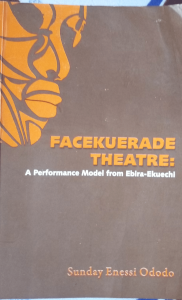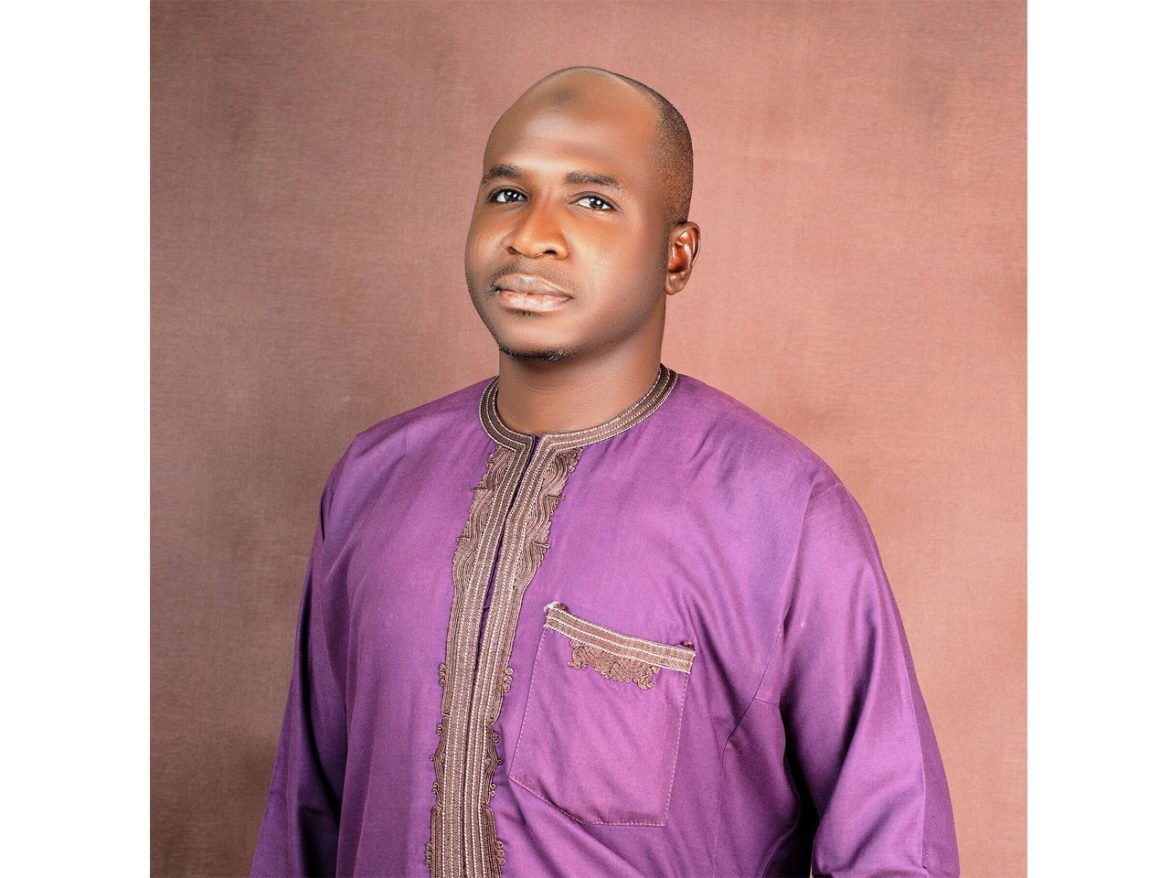Title of the Book: Facekuerade Theatre: A Performance Model for Ebira-Ekuechi
Author: Sunday Enessi Ododo
Reviewer: Aliyu Yakubu Abdulkadir
Publishers: SONTA
Year: 2015
Pages: xxv + 306
Genre: Performance/Theatre Theory
ISBN: 978-978-937-932-3
Facekuerade Theatre is a performance model as well as an aesthetic, epistemological and philosophical exposé. The theory adds to the persistent search by the postcolonial world, Africans in general, and Nigeria in particular to redeem itself from the unending pedagogy of Europe which consistently impels the world to view European culture and aesthetics as the global centre to which everything else is marginal. Taking off from an Ebira-Ekuechi launchpad, the theory fashions out a novel conception of the masquerade rooted in the ancestral metaphors of the Ebira-Tao people. While sustaining the metaphorical opacity that the mask brings to performance, Ododo transfers this metaphor to a more dexterous realization where the function of the masked face (and indeed all masks) is realized without cover.
Facekuerade Theatre builds upon the foundations of notable practitioners since the Greeks, and in Nigeria and Africa; the notable works of Soyinka in the ritual arena, Sutherland’s narrative theatre, the Kwagh-Hir of Hagher, Ukala’s Folkism, Obafemi’s Fabulist theatre, among others. But, there is another, equally important dimension to Facekuerade Theatre: it challenges the limiting tripodization of Nigeria’s culture. In cultural discourse relating particularly to Nigeria, there is a disturbing convention that limits the nation’s cultural heritage to the Hausa, Igbo, and Yoruba contributions. Cultural heritage, says Hassani, is “an invaluable asset of human being” (207).Ododo simply shouts out: we are more than three. He saliently interrogates the rationale for giving three ethnic majority groups the role of speaking for all. Why only Hausa, Yoruba or Igbo in fashioning out theoretical models for performance in Nigeria? Why not also include the so-called minority tribes? Ododo returns to the Ebira-Tao to find answers.
 The ‘Foreword’ to Facekuerade Theatre by the venerable Olu Obafemi recognizes the maverick achievements of the theory, and prepares the reader for the novelty that Ododo presents in his aesthetics. Ododo announces the manifesto of his writing very early in the text: “The purpose of this book,” he writes, “is … a response to the … challenge and an urgent call for the proposition of new forms of theatre” (xiii). The text falls to in a conversation about how to identify a suitable theatrical performance model for Africa as a general move towards decolonizing the continent’s consciousness and redeeming its people into intellectual freedom. This is a crucial task, as Blake asserts in The African Origins of Rhetoric: by returning home, it is so easy to re-discover that we were here first.
The ‘Foreword’ to Facekuerade Theatre by the venerable Olu Obafemi recognizes the maverick achievements of the theory, and prepares the reader for the novelty that Ododo presents in his aesthetics. Ododo announces the manifesto of his writing very early in the text: “The purpose of this book,” he writes, “is … a response to the … challenge and an urgent call for the proposition of new forms of theatre” (xiii). The text falls to in a conversation about how to identify a suitable theatrical performance model for Africa as a general move towards decolonizing the continent’s consciousness and redeeming its people into intellectual freedom. This is a crucial task, as Blake asserts in The African Origins of Rhetoric: by returning home, it is so easy to re-discover that we were here first.
The Ekuechi festival from which facekuerade emanates is described by Ododo as “a reenactment of myth, legend and traditional social events meant to mark the end of the year and usher in a new one” (xxi) among the Ebira-Tao. Celebrated in the last months of the year, the festival combines metaphysics with social aesthetics, inviting divinity to the human realm – Eku e Chi literally means the ancestors are descending (xxii). Ododo states in It’s Only Bent, Not Broken that “the Ebira regard their ancestors as the medium between them and the life forces” so they “anthropomorphized or objectivized their spirits in masks” (128).
But this mask is not always physical. The theatre Ododo proposes is one of social harmony in a contemporary world bursting at the seams with diversity and tension in metaphysical callings. With Christianity and Islam on the race to grab lands in the minds of contemporary Nigerians, Ododo tacitly advocates a return to ancestral sources. For Ododo, “masquerade can be conceived without a mask” (2). And so, he does, as did his forebears, in his theorization of a theatrical model where the unison of dualized-existence is performed to arrest the sameness of the living and dead on the communal and existential-metaphoric stage.
In Facekuerade theatre, nature itself is adopted as costume, because the night for instance becomes worn as a mask; hence, “a performance masquerade character without mask” (4) is what facekuerade entails. At the heart of this idea is deep metaphor: the mask needs not be tangible. The mere act of impersonation entails the blurring and covering of personality, and underneath the new person is the shielded or masked original. From body to utterance to action, everything the performer is, does or becomes is understood as a masking of the self without the illusionary approaches of realism, hence a theatre of anti-illusionism. In this model of performance is the notion of the open secret, where the crypt is undisguised; hence, an invitation to the spectator to participate in the meaning making. This falls deftly in place within the bold Ebira-Tao worldview that is weary of subterfuge.
Ododo conceptualizes his theory from the various performance forms of the Ekuechi. Based on a dual existential model where the self is both existent at the in’eku (the world of the dead) and in the in’ehe (the world of the living), Ododo espouses that the self is the gulf between the world of the living and the domain of the dead. He subsequently outlines the formulating strategies, mechanics and conventions of the facekuerade he proposes. The theatre is also existential with a core concern for cosmic harmony. Understanding this is pertinent for an appreciation of the proposed theatre model with its original Ebira-Tao schematics. Ododo, of course, has his aesthetic politics, which he – in the spirit of Ebira-Ekuechi – vehemently refuses to mask. To this end, it is imperative to restate that the theory Ododo proposes is first of all a postcolonial theory. Then it deliberately navigates into addressing an intra-national dispassion, a celebration of less-sung voices, with no animosity or even cynicism towards the dominant traditions but rather a spirit of complementarity in the quest for aesthetic newness.
Facekuerade is a theatre of creation and recreation (215) much similar to Soyinka’s conception of Yoruba tragedy in Myth, Literature and the African World, and as well transformative theatre in much the same way envisioned by Schechner (219). The transformation is at once real (because the performance is not like life but a part of life) and metaphorical (since it abides in symbolism and triangulation of paramount essences). Hence, we note that for the Ebira, the festival is both play and living. Divine and human agencies are both subjects and mechanisms in the process. As in probably all African theatre, in major distinction with the West, the theatre is not merely game but possesses a functionality that cross beyond passing time: it is part of the social and existential order; as important as metaphysics, art, medical science, astrology and philosophy all combined in the Western imagination. As Ododo traps it: “Eku is a way of life” (217) and encapsulates the intrinsic duality of the Ebira worldview.
Ododo connects to Sartre’s Existentialism, not for sameness in the conception of what constitutes subject and object but in the appreciation of presences and absences. However, Sartre contends that the world can be seen as an infinite series of finite appearances, a position that ultimately rejects the possibility of any kind of dualism. It is here that Ododo, like Soyinka before him, departs from the Western conception of Existence. There is death, but it does not terminate existence. Elechi Amadi points out succinctly in Ethics in Nigerian Culture that there is no universal agreement among scholars regarding how after-life is achieved, and which soul qualifies to return or be reincarnated (5). The African is thus distinct in his cultural aesthetics and existential moralities.
Overall, Ododo’s is a giant stride in the quest for authentic national theory and theatrical aesthetics that does not only satisfy the needs of the present and future, but also emphatically guarantees sustainability through welding the past, present and future in pristine cultural harmony without recourse to needless fabrications or amplification of the Occidental. Like Achebe, he reminds us that Africans did not first hear about culture from the Europeans.
Works Cited
Achebe, Chinua. Hopes and Impediments. Anchor Books, 1990.
Amadi, Elechi. Ethics in Nigerian Culture. Henemann Educational Books, 1982.
Blake, Cecil. The African Origins of Rhetoric. Blackwell, 2009.
Hassani, F. “Documentation of Cultural Heritage: Techniques, Potentials, and Constraints.” The International Archives of the Photogrammetry, Remote Sensing and Spatial Information Sciences. Vol XL-5/W7, 2015. pp207-214
Ododo, Sunday Enessi. It’s Only Bent, Not Broken: Culture, Education, Politics and Performance Art in Ebira and Ogori. SONTA, 2014.
Ododo, Sunday Enessi. Facekuerade Theatre: A Performance Model from Ebira-Ekuiechi. SONTA, 2015.
Sartre, Jean-Paul. Being and Nothingness. Simon & Schuster, 2002.
Schechner, Richard. Performance Theory. Routledge, 2003.
Soyinka, Wole. “The Fourth Stage: Through the Mysteries of Ogun and the Origins of Yoruba Tragedy.” Myth, Literature and the African World. Cambridge University Press, 1972.
————————————————–
Aliyu Yakubu Abdulkadir teaches in the Department of Languages, Federal University of Kashere, Gombe State in Nigeria. He is currently researching for an MA in Literature-in-English in the Department of English, University of Jos. He is also a DAAD fellow at the SDG Graduate School, Centre for the Study and Promotion of Cultural Sustainability, University of Maiduguri, Nigeria, where is pursuing an MA in Cultural Sustainability. His book of poetry, The Banquet was published in 2017.

